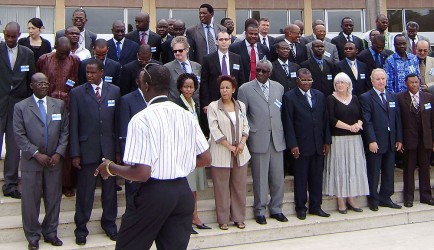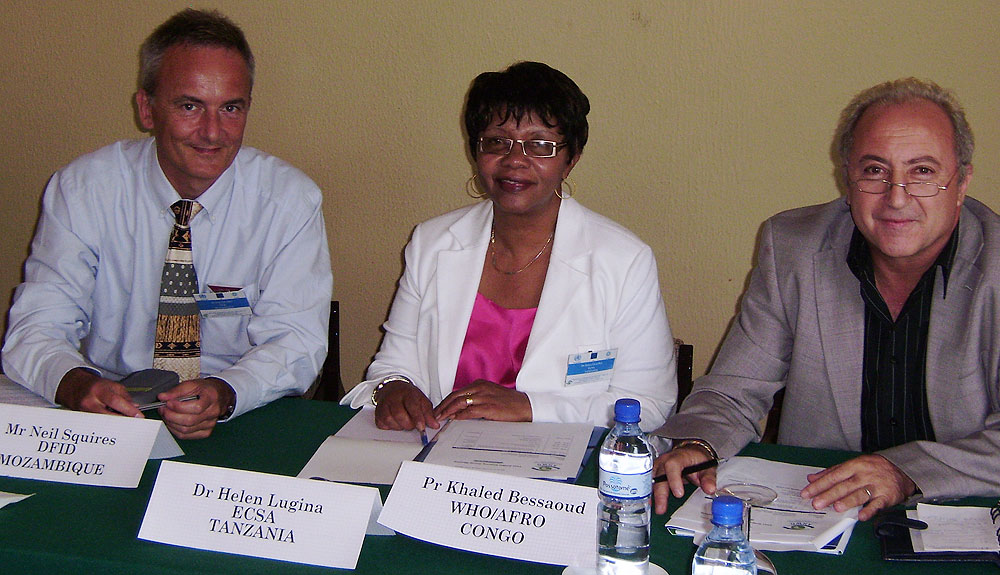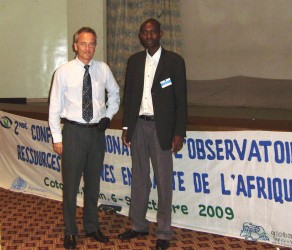
I am writing this at the end of four intensive days of discussion on building regional and national ‘Observatories’ to track the status and progress on strengthening the health workforce in Africa. The meeting of the African Regional Health Workforce Observatory brought together human resource experts and planners from 29 African countries which are currently struggling to address shortages of doctors, nurses and other health workers (the ‘family photo’ shows the participants gathered outside the hotel).
The World Health Organisation hosted this Regional Conference of the African Regional Health Workforce Observatory which was held in Cotonou, Benin, on the coast of West Africa. From the meeting venue it was possible to see tankers and cargo ships lined up and heading to the harbour. Less than two hundred years ago these ships might have been slave boats carrying a human cargo to the Americas, and the slave forts and old slave trading routes are still significant historic landmarks along this coast line. The trade now is supporting African development and the activity and bustle of Cotonou showed many of the signs of this increasing economic activity. I had an anxious trip to the centre of the city in a taxi, weaving between the hundreds of motor-bikes which congest the roads, with the anxiety compounded by the fact that I didn’t see a single motorcyclist wearing a crash helmet!
I had to kick start my French again after 2 years of learning Portuguese in Mozambique, which subjected the francophone participants to some dodgy French grammar, but messages emerging from the meeting were otherwise clear. Coordination of efforts to address the workforce crisis are necessary at the country, regional and global level, and having accurate information and evidence to inform human resource planning, which is a core function of the health workforce observatories, will be critically important.
Thirty-seven of the 54 countries in the world that are facing a real shortage of health workers are based in Africa. International efforts to address the shortages have intensified since the publication of the World Health Report ‘Working Together’ in 2006. International efforts to address the crisis have seen a strengthening of WHO’s capacity to address the problem, as well as the creation of a global alliance (the Global Health Workforce Alliance) to connect and increase alignment of the various partner agencies that can contribute to solutions at country, regional and global levels. The meeting was hosted by WHO and co-financed by the European Commission and the Global Health Workforce Alliance (GHWA), which have both been strong champions of international efforts to address the problem. I’d been invited because of my previous position in the European Commission, having drafted European Union Communications on the health workforce crisis. With Europe contributing significantly to the brain drain of African Health workers, the EU has made a clear commitment to help address the crisis.

Prior to the meeting, there was another meeting of the Steering Committee of the African Regional Health Workforce Observatory, where Helen Lugina, the Director General of the Commonwealth Regional Health Community for East, Central and Southern Africa (ECSA), was elected as chair of the steering committee and I was elected vice-chair. In the attached photo I can be seen with Helen, and Khaled Bessaoud, of the Human Resource Department of the WHO Regional Office for Africa (AFRO). Over the coming year the steering group will agree the strategic priorities of the regional observatory, in order to ensure that effective support is provided to countries as they either set up, or strengthen their national health workforce observatories, often working with WHO Collaborating centres at the country level. The information collected and disseminated by these connected organisations will be essential to track progress increasing health workforce numbers, and to commission research to better understand what is needed to recruit and retain health workers, particularly in remote and under-served areas.

Mozambique is in the process of developing its own Health Workforce Observatory and I accompanied my colleague, Domingos Damia Mondlane, of the Ministry of Health’s Human Resource Department to the meeting (we can be seen here posing before the meeting banner). Domingos has been involved in the development of Mozambique’s Human Resource Strategy, which aims to increase the number of health workers in Mozambique by 20,000 by 2015 - I’ve posted a blog on this previously.
The participants left the meeting charged with ideas for building or strengthening their national observatories and we shall be tracking progress made over the coming months.

Recent Comments